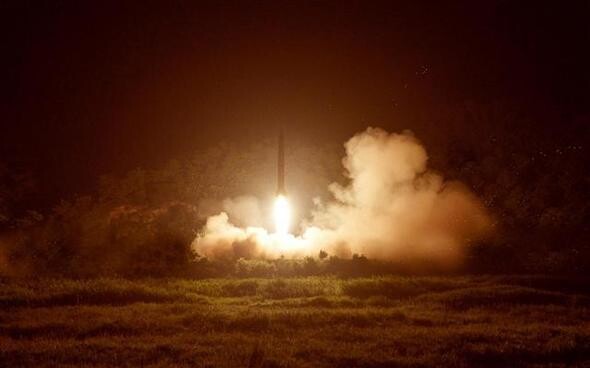hankyoreh
Links to other country sites 다른 나라 사이트 링크
[Editorial] North Korea’s missile launches only make things worse

In the early hours of July 13, North Korea again launched short-range rockets without warning into the East Sea. This year, the North has launched a total of 97 short- and mid-range missiles, rockets, and other projectiles on 14 different occasions. This is three to four times more missiles than it launched in 2013. We urge North Korea to stop this kind of provocative behavior.
The North Korean missile launches appear to be a kind of low-intensity provocation. The North is using low- and mid-range projectiles to make a show of force, avoiding long-range missiles, which would immediately subject the country to additional international sanctions.
The sites of the launches are gradually moving south as well. On July 13, the missiles were launched from north of Kaesong, just about 20 km from the military demarcation line that separates North and South.
In so doing, Pyongyang seems to be suggesting that it can launch missiles at any target in South Korea if it chooses. The timing of the launches is also concentrated in the early hours of the morning, when they are not easy to detect.
North Korea argues that the missile launches are intended to “secure the self-defensive deterrent to overpower foreign provocations.” On July 12, a statement issued by the spokesperson of the policy bureau of North Korea’s National Defense Commission criticized the arrival of the USS George Washington, an American air craft carrier, at the port of Busan to participate in search and rescue training exercises that will be conducted in the seas to the southwest of the Korean peninsula from the middle to the end of this month. It also continued to press Seoul to accept the National Defense Commission’s “special proposal,” which it made on July 7.
However, North Korea’s missile launches only serve to increase instability on the Korean peninsula by putting neighboring countries on alert. If North Korea truly wants dialogue, it must halt its belligerent behavior, beginning with these missile launches. Besides, the ROK-US joint military exercises taking place southwest of Korea are little different from previous years.
North Korea’s provocative missile launches are inextricably related to strained inter-Korean relations. In addition, there is a problem with the North using threats - as it is doing now - in a bid to force the South Korean government to change its attitude.
Nevertheless, it is not appropriate for Seoul to insist on its hard-lined stance toward North Korea, either. What the government needs to do now is to improve its relations with the North - not buckling before pressure from the North, but as part of a coherent, consistent plan.
Improving inter-Korean relations is the prerequisite for resolving all of the issues that are connected with the Korean peninsula. In particular, if there is no improvement in inter-Korean relations, there is little chance of resuming the six-party talks to find a solution to the North Korean nuclear issue.
On the other hand, if inter-Korean relations get worse, this will not only limit the South’s options on these issues, but it will also increase the possibility of an unexpected incident occurring between North and South Korea.
These missile launches hurt North Korea too. Continuing them could provoke new international sanctions. North Korea needs to understand that such a development would only make it harder to improve inter-Korean relations.
Please direct questions or comments to [english@hani.co.kr]

Editorial・opinion
![[Column] Season 2 of special prosecutor probe may be coming to Korea soon [Column] Season 2 of special prosecutor probe may be coming to Korea soon](https://flexible.img.hani.co.kr/flexible/normal/500/300/imgdb/original/2024/0426/3317141030699447.jpg) [Column] Season 2 of special prosecutor probe may be coming to Korea soon
[Column] Season 2 of special prosecutor probe may be coming to Korea soon![[Column] Park Geun-hye déjà vu in Yoon Suk-yeol [Column] Park Geun-hye déjà vu in Yoon Suk-yeol](https://flexible.img.hani.co.kr/flexible/normal/500/300/imgdb/original/2024/0424/651713945113788.jpg) [Column] Park Geun-hye déjà vu in Yoon Suk-yeol
[Column] Park Geun-hye déjà vu in Yoon Suk-yeol- [Editorial] New weight of N. Korea’s nuclear threats makes dialogue all the more urgent
- [Guest essay] The real reason Korea’s new right wants to dub Rhee a founding father
- [Column] ‘Choson’: Is it time we start referring to N. Korea in its own terms?
- [Editorial] Japan’s rewriting of history with Korea has gone too far
- [Column] The president’s questionable capacity for dialogue
- [Column] Are chaebol firms just pizza pies for families to divvy up as they please?
- [Column] Has Korea, too, crossed the Rubicon on China?
- [Correspondent’s column] In Japan’s alliance with US, echoes of its past alliances with UK
Most viewed articles
- 1[Column] Season 2 of special prosecutor probe may be coming to Korea soon
- 2‘We must say no’: Seoul defense chief on Korean, USFK involvement in hypothetical Taiwan crisis
- 3Is N. Korea threatening to test nukes in response to possible new US-led sanctions body?
- 4Division commander ordered troops to enter raging flood waters before Marine died, survivor says
- 5Is Japan about to snatch control of Line messenger from Korea’s Naver?
- 6No good, very bad game for Korea puts it out of Olympics for first time since 1988
- 7[Editorial] Korea’s surprise Q1 growth requires objective assessment, not blind fanfare
- 8Korea’s 1.3% growth in Q1 signals ‘textbook’ return to growth, says government
- 9N. Korean delegation’s trip to Iran shows how Pyongyang is leveraging ties with Moscow
- 10Amnesty notes ‘erosion’ of freedom of expression in Korea in annual human rights report